 | |
Argentina | Canada |
|---|---|
Bilateral relations between the Argentine Republic and Canada have existed for over a century. Both nations are members of the Cairns Group, G20, Organization of American States and the United Nations.
 | |
Argentina | Canada |
|---|---|
Bilateral relations between the Argentine Republic and Canada have existed for over a century. Both nations are members of the Cairns Group, G20, Organization of American States and the United Nations.
Relations between Argentina and Canada date back to 1867, when the Canadian government carried out its first commercial mission to Argentina and other countries in the region. [1] In 1911, Canada opened its first South American trade office in Buenos Aires. [2] In 1940 both nations formally established diplomatic relations. In 1945, Canada opened its first resident embassy in Buenos Aires. [2]
In November 1961, President Arturo Frondizi became the first Argentine head-of-state to visit Canada. [1] During his visit, President Frondizi met with Prime Minister John Diefenbaker. In 1968, Canadian Foreign Minister Mitchell Sharp paid a visit to Argentina and met with President Juan Carlos Onganía. [1] In 1976, Argentina entered into a Military dictatorship. In 1978, the first Aerolíneas Argentinas flight was made between Buenos Aires and Montreal. [1]
In April 1982, the Falklands War began between Argentina and the United Kingdom. During the war, Canada remained neutral, however, Canada withdrew its Ambassador from Buenos Aires. [3] The decision to remain neutral by Prime Minister Pierre Trudeau was to distance Canadian foreign policy, economics, and military commitments from those of both the United States and the United Kingdom. [4]
In 1994, Argentine President Carlos Menem paid a visit to Canada. In 1995, Prime Minister Jean Chrétien became the first Canadian head-of-government to visit Argentina. [1] In recent years, both nations have jointly engaged in reconstruction and peacekeeping operations in Haiti and have collaborated as part of the Group of Friends of Haiti, as well as through the United Nations Stabilisation Mission in Haiti (MINUSTAH).
In 2013, Canada sent election observers during the Falkland Islands sovereignty referendum. Canada's official position is that the Falkland Islanders should decide their own destiny.[ citation needed ]
In November 2016, Canadian Prime Minister Justin Trudeau paid an official visit to Argentina and met with President Mauricio Macri. During his visit, both nations marked the 75th anniversary of bilateral relations. [5] Both leaders also discussed the re-establishment of the annual Argentina-Canada bilateral human rights consultations; maintaining an ongoing dialogue on deepening the Canada-Mercosur trade and investment relationship; enhancing efforts to address climate change through the full and effective implementation of the Paris Agreement, and strengthen bilateral and multilateral cooperation on disarmament, non-proliferation, and the peaceful use of nuclear energy. Both countries committed to resuming their nuclear regulatory cooperation and re-establishing bilateral nuclear consultations pursuant to the Canada-Argentina Nuclear Cooperation Agreement. [5]
The Canadian government invited Argentina to the G7. President Mauricio Macri and other officials attended the summit.
In November 2018, Prime Minister Trudeau visited a second visit to Argentina to attend the G20 Buenos Aires summit.

High-level visits from Argentina to Canada
High-level visits from Canada to Argentina
Both nations have signed several agreements such as an Agreement for the construction of the nuclear power plant in the Río Tercero Reservoir (1976); Air Transport Agreement (1979); Agreement for the Promotion and Protection of Investments (1993); Agreement on Avoidance of Double Taxation and the Prevention of Fiscal Evasion with Respect to Taxes on Income and on Capital (1994); Treaty on Mutual Criminal Assistance (2000); Memorandum of Understanding in energy efficiency (2018); Memorandum of Understanding in policies in the mining sector (2018); and a Memorandum of Understanding in cooperation in nuclear energy (2018). [6]
In 2018, two-way trade between Argentina and Canada totaled US$2 billion. [2] Argentina's main exports to Canada include: gold and other minerals; wine; fruit (apples and citrus); mineral ores and prepared vegetable foodstuffs. Canada's main exports to Argentina include: machinery and parts; aerospace products; pharmaceutical products; and electrical and electronic machinery and equipment. [2] Argentina is Canada's 53rd-largest export destination globally. In March 2018, Mercosur trade bloc ministers (which includes Argentina) agreed to launch formal negotiations toward a comprehensive Canada-Mercosur free trade agreement (FTA). [7] Canadian multinational gold mining company, Barrick Gold, operates in Argentina.


This article deals with the diplomatic affairs, foreign policy and international relations of the Argentine Republic. At the political level, these matters are handled by the Ministry of Foreign Affairs, also known as the Cancillería, which answers to the President. The current Minister of Foreign Affairs, since December 2023, is Chancellor Diana Mondino.

The Argentina–Brazil relationship is both close and historical, and encompasses the economy, trade, culture, education, and tourism. From war and rivalry to friendship and alliance, this complex relationship has spanned more than two centuries. The countries also share a system of government, a federal republic with a presidential system.
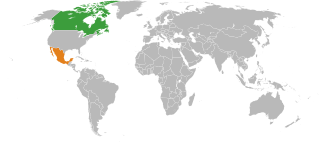
The nations of Canada and Mexico established formal diplomatic relations in 1944. Initially, ties between the two nations were dormant, but since the 1990s relations between Canada and Mexico have positively developed as both countries brokered NAFTA.
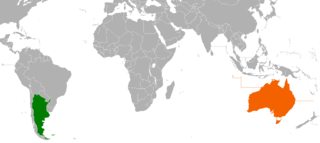
Bilateral relations between Argentina and Australia have existed for years. Both nations are members of the Cairns Group, Forum of East Asia–Latin America Cooperation, G20 and World Trade Organization.

The current and historical relations between the Argentine Republic and the Republic of South Africa, for over a century. Both nations are members of the Cairns Group, G20, Group of 77 and the United Nations.

Diplomatic relations between the Argentine Republic and Ukraine have existed for decades. The importance of relations centers on the history of Ukrainian migration to Argentina. Ukrainians in Argentina form the second largest Ukrainian community in Latin America numbering approximately 250,000 Ukrainians and their descendants.
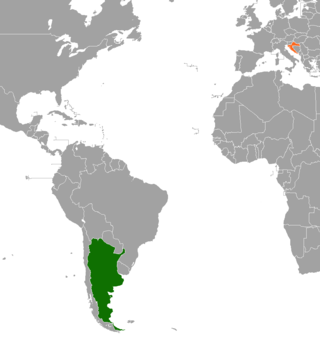
Argentina and Croatia both enjoy friendly relations, the importance of which centers on the history of Croatian migration to Argentina. There is approximately a community of 250,000 Argentines of Croatian descent. Both nations are members of the United Nations.

Bilateral relations between the Argentine Republic and the Republic of India, have existed for decades. Argentina has an embassy in Delhi and a Consulate General in Mumbai whilst India has an embassy in Buenos Aires. Both countries are members of G20, Group of 24 and Group of 77.

Current and historical relations between the Argentine Republic and the Russian Federation have existed for decades. Both nations are members of the G20 and the United Nations.
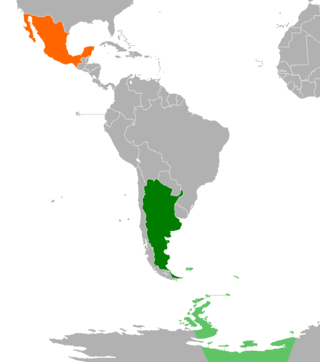
The nations of Argentina and Mexico established diplomatic relations in 1888. Both nations are members of the Community of Latin American and Caribbean States, G-20 major economies, Latin American Integration Association, Organization of American States, Organization of Ibero-American States and the United Nations.

The Argentine Republic and the Italian Republic have had bilateral relations for over a century. Both nations enjoy friendly relations, the importance of which centers on the history of Italian migration to Argentina. Argentines of full or partial Italian ancestry number approximately 30 million, or 62% of the country's total population. Both nations are members of the G20 and the United Nations.

Bilateral relations between the Argentina and Finland, have existed for over a century.

The current and historical relations between the Argentine Republic and the Portuguese Republic, have existed for over a century. Both nations are members of the Organization of Ibero-American States and the United Nations.

Argentina–Iran relations are the diplomatic relations between the Argentine Republic and the Islamic Republic of Iran. Initially, relations between both nations were cordial; however, relations strained after the bombings of the Israeli embassy in Buenos Aires in 1992 and against the Asociación Mutual Israelita Argentina (AMIA) in 1994, also in Buenos Aires. Since then, the Argentine government has accused Iran and its proxies for attacks on its territory.

Foreign relations between Argentina and the Holy See, have existed for over a century. The current pope, Pope Francis, was the former Archbishop of Buenos Aires.
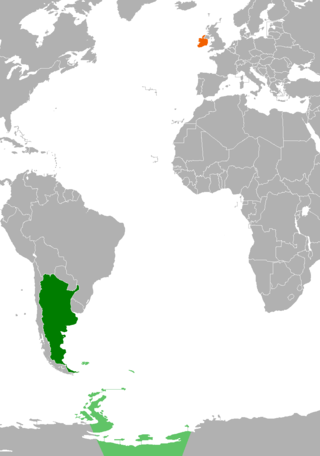
Foreign relations between the Argentine Republic and Ireland, have existed for over a century. Both nations share a history of Irish culture after over 50,000 Irish settlers migrated to Argentina. Argentina is home to the fifth largest Irish community abroad and the biggest in a non-English speaking nation. Over half a million Argentine nationals claim Irish heritage. Both nations are members of the United Nations.

Diplomatic relations between the Argentine Republic and the Republic of the Philippines, have existed for decades. Both nations are members of the Association of Academies of the Spanish Language, Group of 77, the G20 developing nations, and Forum of East Asia-Latin America Cooperation and the United Nations.

The presidency of Mauricio Macri began on 10 December 2015, when Mauricio Macri was sworn into office on 10 December 2015 to a four-year term as president of Argentina. Macri took office following a 51.34% to 48.66% runoff ballotage win over Daniel Scioli in the 2015 general election. He is Argentina's first democratically elected non-Radical or Peronist president since 1916. In elections of October 2019, he lost his re-election bid for a second term and was succeeded by Alberto Fernández as president. Macri is also the first incumbent president in Argentina and South America's history to be unseated by a challenger and not reaching a second term.

Current and historical relations between Argentina and Azerbaijan have existed for decades, since Argentina's recognition of Azerbaijan on 9 March 1992.
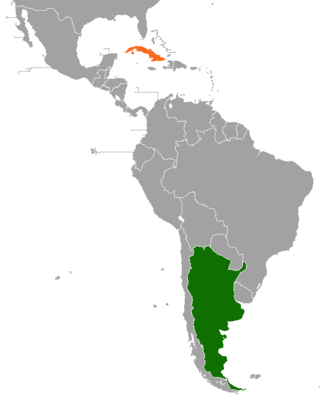
Current and historical relations between Argentina and Cuba, have existed for over a century. Both nations are members of the Community of Latin American and Caribbean States, Latin American Integration Association, Organization of American States and the Organization of Ibero-American States.
{{cite journal}}: CS1 maint: location (link)